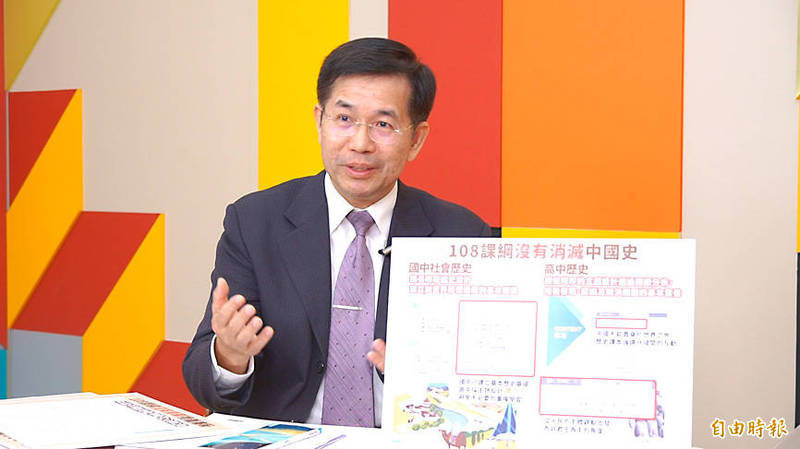《TAIPEI TIMES》2029 curriculum to foster ‘global citizens’: minister

Minister of Education Pan Wen-chung speaks during an interview with the Chinese-language Liberty Times (sister paper of the Taipei Times) published yesterday. Photo: Chen Pin-yu, Taipei Times
DIGITAL KNOWLEDGE: The curriculum developer is collecting data on the fast technological changes wrought by generative AI as it updates the guidelines
By Rachel Lin and Jake Chung / Staff reporter, with staff writer
The upcoming 2029 curriculum is to keep up with the times, focusing on fostering the qualities of a “global citizen” and enhancing student knowledge of digital technologies and concepts, Minister of Education Pan Wen-chung (潘文忠) said in an interview with the Chinese-language Liberty Times (the sister paper of the Taipei Times) yesterday.
The first Curriculum Guidelines for 12-year Basic Education were implemented in 2019 and were the primary reference material for schools, textbook publishers and the government when preparing courses, textbooks and examinations.
Pan said that the process for reviewing the guidelines was transparent, and members of the review panel had been reviewed and approved by a cross-party committee at the Legislative Yuan, highlighting the guidelines’ transparency and objectivity, compared with previous guidelines.
The guidelines are subject to a review every decade, he said.
Their next iteration would continue to foster qualities required for an individual to be considered a “global citizen,” including the ability to see things from a global perspective, Pan said.
The ministry is aware of the rapid technological changes brought about by the development of generative artificial intelligence (AI), and the National Academy for Educational Research is collecting data in preparation for the 2029 review, he said.
The 2019 guidelines do not explicitly state what kind of information technology (IT) should be taught or used to prevent schools and educators from being constrained, while the overarching theme of developing IT and media competency under the guidelines encourages all studies to use an appropriate level of IT-based education and learning methods, he said.
In the meantime, the ministry would assist teachers in gradually incorporating knowledge of such concepts and skillsets into courses to prepare children for the future, he added.
For example, the ministry in October announced that junior-high schools and elementary schools should use generative AI as a teaching tool, he said.
The ministry would organize workshops starting next year to help teachers use generative AI in course preparation, education and grading, he said.
These efforts would form the foundation upon which the National Academy for Educational Research builds a comprehensive digital learning program that would be led by school principals who are tech-savvy, he added.
The ministry is looking to introduce generative AI into its digital learning platform, and 300 classes nationwide have been asked to participate in a trial to assess the impact of generative AI on student learning, he said.
Pan also rejected allegations that the 2019 guidelines were “immoral and shameless,” citing Taiwan’s ranking on the 2023 World Competitiveness Yearbook as proof of their success.
Taipei First Girls’ High School Chinese literature teacher Ou Kui-chih (區桂芝) on Monday criticized the guidelines for reducing the number of classical Chinese texts taught in schools, citing specifically the omission of writings about morality by the Ming Dynasty academic Gu Yanwu (顧炎武), the omission of which Ou said failed to teach students about propriety.
Pan said that the 2019 guidelines exposed children to new and more critical issues and increased their competitiveness.
He also said that literary Chinese education aims to foster students’ mental acuity for analysis and learning to express their opinions, and the “point” was not whose works were being cited or how much literary Chinese was studied.
新聞來源:TAIPEI TIMES
















